/regions/political
Political
Environmental monitoring programme on water quality in Kerala – A report by KSCSTE and CWRDM
Posted on 03 Nov, 2011 08:54 PM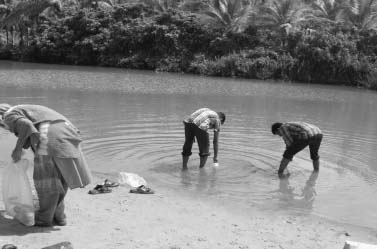 This report by the Kerala State Council for Science, Technology and Environment (KSCSTE) and Centre for Water Resources Development and Management (CWRDM) on water quality monitoring in Kerala covers all its forty four river basins. This is being done under the “Environmental Monitoring Programme on Water Quality” under which samples are being collected both from surface and groundwater sources.
This report by the Kerala State Council for Science, Technology and Environment (KSCSTE) and Centre for Water Resources Development and Management (CWRDM) on water quality monitoring in Kerala covers all its forty four river basins. This is being done under the “Environmental Monitoring Programme on Water Quality” under which samples are being collected both from surface and groundwater sources.
Groundwater sampling stations were fixed after conducting a sanitary survey in the panchayats. Water Quality Information System is being developed using Geographical Information Systems (GIS) to manage the water quality from point or non-point source of pollution.
In the first phase of the project, three river basins of Kerala viz. Kabbini, Periyar and Neyyar were monitored. The network was later expanded to basins such as Chaliyar, Kadalundi, Meenachil, Karamana, Anjarakandi, Pamba, Muvattupuzha, Bharatapuzha, and Chalakudy.
Jeevan Vidhya Workshop, December 4 – 9, 2011, Sirsi, Karnataka
Posted on 03 Nov, 2011 08:09 PMOrganizer: Centre for Holistic Learning, Jeevanshala Trust
Venue: Sirsi, Karnataka

Jeevanshala Trust like to think of ourselves as constituting an open learning community/network for mature learners. The programs we conduct are for 'grown-ups', and the content of the programs is of a sort that is not to be found in conventional institutions of learning...
We are a motley group of people, linked together by our vision of wholesome meaningful lives for everyone, and by our advocacy of such living...
Impacts of climate change on public health in India - Paper published in Environmental Health Perspectives
Posted on 03 Nov, 2011 07:40 PMThis paper published in the journal Environmental Health Perspectives briefly summarises the relevant literature and highlights the challenges and opportunities for innovative research in the context of the impact of changing temperatures and precipitation patterns due to climate change on the health of populations from developing countries such as India.
Water data at your fingertips !
Posted on 02 Nov, 2011 11:21 AMThe Data Finder aims to bring together all water data from all over the web and put them in one convenient searchable tool so you can use it for any projects you are working on.
Climate change impact assessment of water resources of India - A paper from Current Science
Posted on 02 Nov, 2011 10:52 AMThis paper published in the journal Current Science presents the findings of a study has been taken up to quantify the possible impacts of the climate change on the water resources of Indian river systems within the constraints of the uncertainty of climate change predictions. The study uses the PRECIS daily weather data to determine the spatio-temporal water availability in the river systems.
A distributed hydrological model, namely SWAT has been used to simulate all the river basins of the country. The analysis has been performed to evaluate the severity of droughts and floods and thus identify the vulnerable hotspots that may require attention in view of the climate change in various parts of the country.
Impacts of climate change and climate variability on the water resources are likely to affect irrigated agriculture, installed power capacity, environmental flows in the dry season and higher flows during the wet season, thereby causing severe droughts and floods in urban and rural areas. Climate change impacts on water resources which are addressed and analysed in the present study include impacts on annual and inter-annual water availability as well as extreme events of droughts and floods.
Management of landslides and snow avalanches - National disaster management guidelines by National Disaster Management Authority
Posted on 02 Nov, 2011 08:15 AM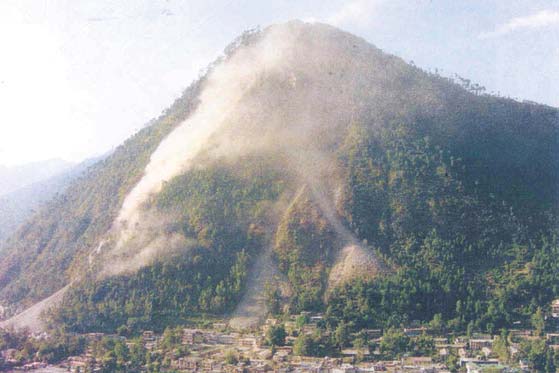 These guidelines by the National Disaster Management Authority (NDMA) on management of landslides and snow avalanches aim to reduce the enormous destructive potential of landslides and minimize the consequential losses by institutionalizing the landslide hazard mitigation efforts.
These guidelines by the National Disaster Management Authority (NDMA) on management of landslides and snow avalanches aim to reduce the enormous destructive potential of landslides and minimize the consequential losses by institutionalizing the landslide hazard mitigation efforts.
It is necessary that the hazard must first be recognized, the risk analyzed and an appropriate strategy developed at the national level to mitigate its impact. To achieve this objective, the NDMA initiated a series of consultations for drafting the national guidelines on landslides and snow avalanches to guide the activities envisaged for mitigating the risk emanating from landslides at all levels. The guidelines include regulatory and non-regulatory frameworks with defined time schedules for all activities. It is envisioned that all national and state disaster management plans and policies for landslides will be formulated and implemented keeping in view the overall framework of the guidelines.
A decade of the Total Sanitation Campaign - Rapid assessment of processes and outcomes - A report by the World Bank
Posted on 01 Nov, 2011 10:07 PM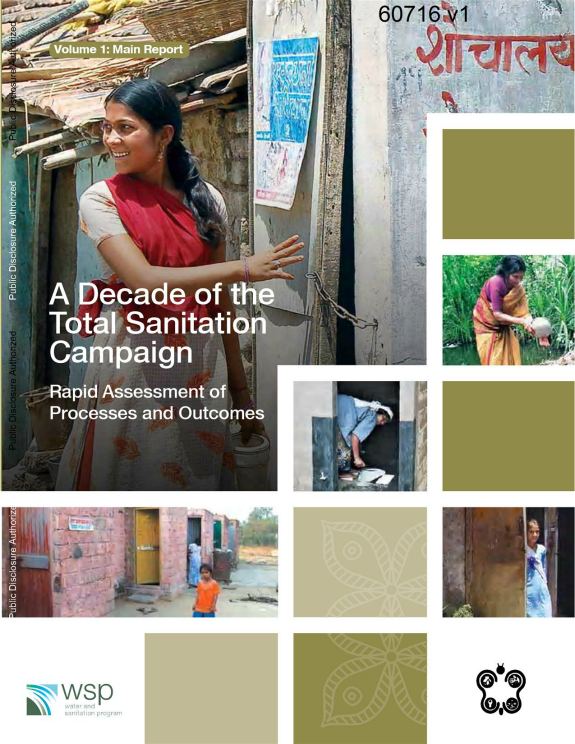 This report by the Water and Sanitation Program (WSP), The World Bank analyses primary and secondary data from the Total Sanitation Campaign (TSC) of the Government of India, which has been in operation for over a decade (1999 to date).
This report by the Water and Sanitation Program (WSP), The World Bank analyses primary and secondary data from the Total Sanitation Campaign (TSC) of the Government of India, which has been in operation for over a decade (1999 to date).
The audience for this report includes policy-makers and implementers at national, state and district levels, and the broader sanitation and hygiene community. The report aims at gaining an understanding of the processes, outputs and outcomes of the campaign at a national level and across the states as compared with the inputs that have gone into the program.
The report draws on these indicators, which are then compared individually and in combination to benchmark the states, to understand the relative performance of the states. This benchmarking, based on a combination of eight indicators, is undertaken for both states and districts across the country.
Lakes in Mumbai – A draft report by WWF India
Posted on 01 Nov, 2011 08:59 PM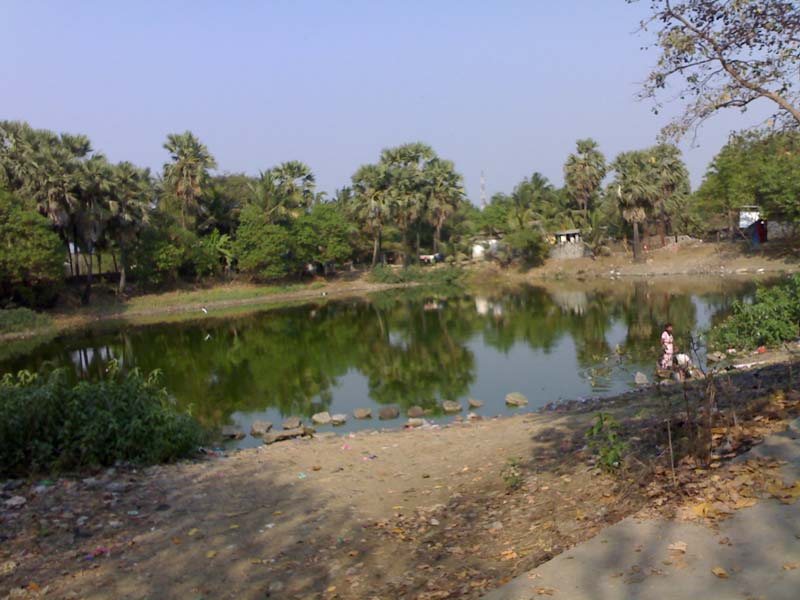 This draft report on the study of lakes by the World Wildlife Fund for Nature (India) documents the physical condition of the lakes in Mumbai. Apart from the three lakes - Tulsi, Powai and Vihar that used to provide water to Mumbai residents, there are many lakes in the Bombay Municipal Corporation jurisdiction that are either polluted by human sewage or industrial effluents and have remained neglected with increasing urbanization.
This draft report on the study of lakes by the World Wildlife Fund for Nature (India) documents the physical condition of the lakes in Mumbai. Apart from the three lakes - Tulsi, Powai and Vihar that used to provide water to Mumbai residents, there are many lakes in the Bombay Municipal Corporation jurisdiction that are either polluted by human sewage or industrial effluents and have remained neglected with increasing urbanization.
There is very little to no data available on the existence of lakes of Mumbai. Several RTI’s to the government bodies also revealed that there was a lacuna in terms of the availability of the data; as a result most of the water bodies are easily exploited. Under this study the baseline data was prepared with the help of Google Earth website. The areas appearing to be lakes were marked on the Google Earth Images. These were verified by the field staff through onsite visits. The survey was conducted during September and October, 2008 and March, 2009. The study considers only the fresh water lakes which were accessible and saline water impoundments have not been considered.
Zero tillage in the rice-wheat systems of the Indo-Gangetic plains - A review of impacts and sustainability implications by IFPRI
Posted on 31 Oct, 2011 06:49 PM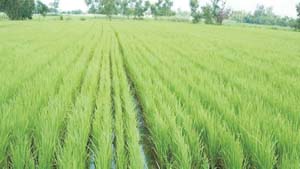 This paper by the International Food Policy Research Institute (IFPRI) reviews the success of zero-tillage wheat in the rice-wheat systems of the Indo-Gange
This paper by the International Food Policy Research Institute (IFPRI) reviews the success of zero-tillage wheat in the rice-wheat systems of the Indo-Gange
Equity and inclusion in sanitation and hygiene in South Asia - A regional synthesis paper - WSSCC, UNICEF and WaterAid
Posted on 31 Oct, 2011 03:31 PMThis working paper by the Water Supply and Sanitation Collaborative Council (WSSCC), UNICEF and WaterAid highlights the fact that a staggering 716 million men, women and children defecate in the open every day, in South Asia, contributing to the most appalling concentration of poverty and disease and the poorest standards of hygiene in the world.